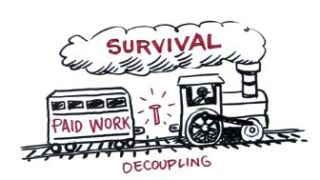COVID-19 Impact on Live Register and the need to secure Decent Work

The Central Statistics Office (CSO) today published the Live Register and Monthly Unemployment Estimates showing a combined total of 513,350 for those on the Live Register and those in receipt of COVID-19 Related Payments[1]. While the live register is not an accurate measure of unemployment, it is a rich dataset and offers a useful barometer of the nature and pace of change in employment and unemployment. Increases suggest a combination of more people unemployed, more people on reduced employment weeks and consequently reductions in the availability of employment hours to the labour force.
Isolating Live Register data from the overall total, unadjusted figures show 205,209 people on the Live Register, while the seasonally adjusted figure is 207,037. Within the seasonally adjusted data, the number of people on the Live Register for one year or more rose slightly between February 2020 and March 2020 (66,871 to 66,965), compared to an increase of 19.4 per cent in those on the register for less than a year (an increase of 22,499 people). While we cannot tell for certain if this increase would not have happened in normal circumstances, it seems likely that many have lost employment due to the direct or indirect economic impact of the current crisis. The fact that they could not, for whatever reason, avail of the specific emergency payments is concerning and highlights the need to ensure Decent Work remains a tenet of any new Social Contract. We must also move away from the concept that "work" is always synonymous with paid employment.
In our Election Briefing on Work, which seems a long time ago now, Social Justice Ireland outlined a series of things Government could do to address issues of low pay, precarity, participation and equity. These will again become relevant as we emerge from the current crisis to a new economic reality for many:
On Low Paid or Precarious Work
- Government should set a timeframe to move to equalise the National Minimum Wage and the Living Wage.
- Policy should seek at all times to ensure that new jobs have reasonable pay rates, and the labour inspectorate should be adequately resourced.
- Income Tax Credits should be made refundable as part of the process of addressing the working poor and making the tax system fairer.
- Government should seek to remove unemployment and poverty traps by integrating income tax, welfare and employment policies.
On Labour Force Participation
- Government must address obstacles faced by women returning to the labour force by increasing the provision of affordable childcare, improving employment and flexibility, and providing information and training.
- The next Government should also Increase resources for the up-skilling of the unemployed, particularly those at risk of becoming long-term unemployed or with low education levels, through integrated training and labour market programmes.
- With the need to move towards a carbon-neutral economy, there is ample opportunity to create employment in low-carbon sectors, if investment is correctly targeted.
On Recognising All Types of Work
- Government should recognise that the term “work” is not synonymous with the concept of “paid employment”. Everybody has a right to work, i.e. to contribute to his or her own development and that of the community and wider society. This should not be confined to job creation. Work and a job are not the same thing.
- The priority given to paid employment over other forms of work is an assumption that must be challenged. Most people recognise that a person can be working very hard outside a conventionally accepted “job”. Greater recognition should be given to the work carried out by carers in Ireland, and policy reforms should be introduced to reduce the financial and emotional pressures on them.
- A system of Basic Income would represent a social welfare system fit for a 21st century economy. It would reward all contributions to society, while offering flexibility and eliminating unemployment traps.
[1] The CSO has provided a detailed explanatory note on the effect of COVID-19 measures on the Live Register, which may be accessed here: https://www.cso.ie/en/releasesandpublications/in/mue/inlrmue/

GIVING A VOICE TO THOSE
WHO DON’T HAVE A VOICE
When you support Social Justice Ireland, you are tackling the causes of problems.
